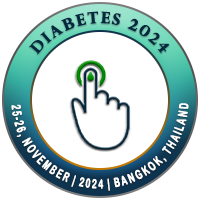
Luciane Bresciani Salaroli
University of Espirito Santos, BrazilTitle: Insulin resistance by the triglyceride-glucose (TyG) index in a rural Brazilian population
Abstract
The TyG index was created in 2008 as a less costly
and invasive alternative to determine the insulin
resistance of an individual, being a viable option as
a screening tool for individuals at higher health
risk, especially those with difficult access to
services health, such as rural, peripheral and
indigenous populations. In this context, researchers
have recently elaborated a cutoff point using a rural
Brazilian population. The present study is the first
in Brazil using this methodology and aims to
estimate the prevalence of insulin resistance
through the TyG index and its association with
sociodemographic, occupational, lifestyle and
health indicators in a rural Brazilian population.
This is a cross-sectional study with 790 farmers in
the state of Espírito Santo/Brazil. TyG was
calculated and a cut-off point of Ln 4.52 was used.
A hierarchical logistic regression for the
association of insulin resistance with
sociodemographic, labor, lifestyle and health
variables of farmers living in Espírito Santo was
performed. The prevalence of insulin resistance
was 33.7% (n=266), and the association with
insulin resistance was found in the age group 31 to
40 years of age (OR=1.85; 95%CI 1.19-2.87); in
smokers or former smokers (OR=1.63; 95%CI
1.08-2.48) and overweight (OR=3.06; 95%CI 2.22-
4.23).
The prevalence of insulin resistance was high in a
rural population of Brazil, and was mainly
associated with age, smoking and obesity. The use
of TyG as an instrument for assessing the health of
individuals living in areas where access to health
services is difficult, such as rural areas, can
represent an important advance in terms of health
promotion, protection and recovery. In addition, by
identifying the risk factors associated with IR, as
well as their consequences, a more adequate
scheme for the prevention and treatment of these
comorbidities can be defined.
Biography
Nutritionist from the Federal University of Ouro
Preto, PhD in Physiological Sciences (PPGCFUFES) and Master in Public Health (PPGSC-UFES). She is currently a postdoctoral fellow in
Epidemiology at the Faculty of Public Health at
USP, is an Associate Professor at the Federal
University of Espírito Santo, a permanent lecturer
at the Postgraduate Program in Collective Health -
PPGSC and a permanent lecturer at the
Postgraduate Program in Nutrition and Health. -
PPGNS, in which she was Coordinator from 2019
to 2021.

